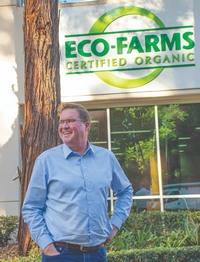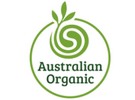One of the nation’s largest organic distributors, which exports high-quality Australian products to global markets in more than 14 countries, has reiterated calls for the introduction of a national standard relating to use of the word “organic”.
 Eco-Farms, Chief Executive Officer, Erik Eide, said he stands with the farmers, retailers and exporters across the organic supply chain who support this change to ensure the integrity and future growth of this burgeoning sector.
Eco-Farms, Chief Executive Officer, Erik Eide, said he stands with the farmers, retailers and exporters across the organic supply chain who support this change to ensure the integrity and future growth of this burgeoning sector.
“There is a clear trend, here and around the world, in identifying how food is produced and the impact it is having on health and the environment. As this trend continues, more consumers will be driven towards the many benefits of organic goods,” Mr Eide said.
“A mandatory national standard is necessary to support the trust and integrity associated with our whole industry, both domestically and when entering emerging markets. We require an established framework that guarantees the quality of our national organic offering.
“Without a regulatory framework and consistent regulation in place, it is currently possible for products to be labelled as organic when they are not certified. Without this certified standard, the meaning of the word will be confused by consumers, and this confusion will undermine the principles supporting organic methods and the proper certification processes.”
This pressing issue is currently under review by the Organics Industry Advisory Group which was established in December 2020 by the Department of Agriculture, Water and the Environment, as requested by the Federal Minister for Agriculture, David Littleproud.
Mr Eide said he was hopeful a positive outcome from this process would lay a strong foundation upon which the Australian organic supply chain could capture growing domestic and global market opportunities.
“The organic claim is very attractive in marketing, so integrity when making that claim is critical,” Mr Eide said. “Without integrity we threaten consumer-driven demand across the industry. That’s why we need trusted certification to provide clarity and a robust guarantee to the consumer.”
Chief Executive Officer of Australian Organic Limited (AOL) and member of the Organics Industry Advisory Group, Niki Ford, said exporters like Eco-Farms were being held back by the lack of a national standard.
“Australia is lagging behind the rest of the world, as it is one of the only developed countries without a mandatory regulation,” Ms Ford said. An organic standard will streamline exporters’ access to more markets and reduce the burden of having to pay separate fees and meet specific regulations for each individual customer nation. It is also essential that anyone paying for a product has certainty and peace of mind it is exactly what it claims to be on the label.”
Ms Ford said the Australian organic sector currently contributed more than $2 billion to the national economy and was poised for annual growth of 14.6 per cent. “However, to fully realise the growth that can come from the soaring demand for homegrown organic products, it is vital for Australia to achieve a consistent domestic regulatory framework.”
Mr Eide said The Bud trademark logo used on Eco-Farms products, which is obtained through certification by ACO Certification Limited, was best positioned to be Australia’s single national symbol for certified goods.
“The Bud is a well-recognised symbol for the Australian organic market and is already trusted by consumers,” he said. “In export markets, The Bud is a symbol of food provenance, clearly stating the product was grown under the Australian Certified Organic Standard, and this has proven to have a significant value.
“Domestic regulation is a step forward in supporting the full supply chain as we unlock new markets and deliver more organic goods to consumers.”
 For more information:
For more information:
Australian Organic
www.austorganic.com










